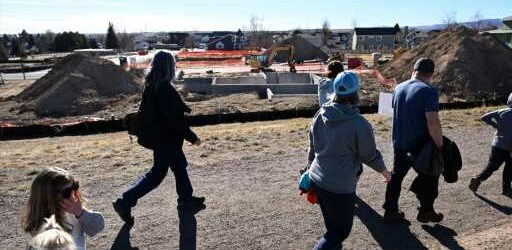Scores of homeowners who lost their houses in the Marshall fire will run out of insurance next week to cover their temporary living expenses while they rebuild, and now Colorado’s insurance commissioner is asking companies to voluntarily cover those rent and mortgage costs.
Insurance Commissioner Michael Conway last week issued a letter to all insurance carriers asking them to expand Marshall fire victims’ coverage that pays for rent or a second mortgage while families rebuild. He gave the insurance companies until Dec. 30 — the anniversary of Colorado’s most destructive wildfire — to let the state know whether they will comply.
The commissioner plans to publish a list of companies that agree to extensions and a list of those who do not, said Vincent Plymell, an insurance division spokesman.
However, there’s no enforcement capability to compel companies to do so. And there’s no indication that insurance carriers in Colorado will open their pocketbooks to everyone in need.
“In the immediate months after the Marshall fire, the Colorado Division of Insurance reached out to all of you, the companies who sell homeowners insurance in Colorado — specifically the companies who had policyholders impacted in the Marshall fire. We asked you to help the survivors on key issues to help make life a little easier in the terrible aftermath of one of Colorado’s worst disasters. We asked you to step up to help the Marshall fire survivors and overwhelmingly you did.” Conway wrote.
“The Division is again asking you to step up to help the Marshall survivors.”
No agency has exact numbers on how many owners of the more than 1,000 houses in Boulder County destroyed in last winter’s wildfire have just one year of coverage for living expenses such as rent, utilities and mileage for commutes. But Katie Arrington, Boulder County’s assistant recovery manager, said historical and anecdotal data from other disasters in the county show about 15% of victims run out of such coverage in a year.
The county has hired recovery navigators to help victims manage their losses and, out of the 342 households that have asked for help, 42 are running out of additional living expenses through their insurance policies, Arrington said. That 12% rate — about 130 homeowners — makes recovery navigators believe the Marshall fire will follow historical trends in the number of people who run out of coverage after one year.
Pushed by intense winds that gusted as high as 115 mph, the Dec. 30 firestorm killed two people and destroyed 1,084 homes and seven commercial buildings in Superior, Louisville and unincorporated Boulder County. Damage estimates now exceed $2 billion, making it the costliest fire in Colorado history and the 10th most expensive in the nation.
Only a handful of people have started constructing new homes, and it could take another year or two for most people to completely rebuild. Typically, insurance policies provide one or two years of money so families can pay for housing while they wait for their homes to be repaired or rebuilt after a disaster that makes them unlivable.
But only one person who lost a home in the Marshall fire is expected to have moved into a new house by Dec. 30.
It’s nearly impossible for anyone who loses a home to get back into a new home within 12 months, said Amy Bach, executive director of United Policyholders, a nonprofit organization that advocates for insurance customers. There are multiple reasons for this, including a shortage of homebuilders and construction workers.
“The people who have 12 months right now are very, very upset because they have asked their insurance companies to extend and let them collect benefits,” Bach said “The insurance companies have been saying no.”
After the Marshall fire, the Colorado legislature created a law that requires homeowners insurance policies to provide up to three years of additional living expenses, but only when a home is a total loss in a wildfire and as long as a homeowner is demonstrating an attempt to rebuild in a timely manner.
But the law is not retroactive, so it does not benefit Marshall fire victims.
Rebuilding already took too long
Tim McCormick, who lost his 6,300-square-foot home on a cul de sac in unincorporated Boulder County, has been battling his insurance company for months over what it will cost to rebuild.
He has received estimates that it will cost $2.7 million, while his insurance company offered $1.6 million — even though his policy guaranteed total replacement coverage. Until they reach an agreement, no construction will start.
McCormick has 24 months of additional living expenses covered under his policy, but isn’t sure if he will have a new house by then. So he bought a new house for $1.1 million in Lafayette. It was either pay $12,000 a month to rent the equivalent of what he lost in the Marshall fire or go ahead and buy the new house while he rebuilds, he said.
“While they would never admit it, they want to delay the process so that they do not have to pay beyond the 12- to 24-month temporary living expenses,” McCormick said. “They also can deny your claim if you do not complete your rebuild within the policy limits. My limit is 24 months and building a home was taking three years before the fire.”
Insurance policies are contracts between the company and their customers, said Carole Walker, executive director of the Rocky Mountain Insurance Information Association, which represents the industry.
Under state law, insurance companies in Colorado must offer homeowners 24 months of additional living expenses when they are selling a policy. But people aren’t required to buy it. When homeowners gamble that they won’t need more than a year and then ask an insurance company to give them more money that wasn’t part of the policy they agreed to, it hurts the carrier’s bottom line, Walker said.
“The insurance companies would be paying out claims for premiums they never took in,” Walker said. “But if companies just pay that, where does it put them as far as solvency on their own balance sheet?”
Additional living expenses cost insurance companies millions of dollars, Walker said, noting that her insurance company last year paid her $5,000 a month in living expenses for eight months after her condominium flooded.
If insurance companies were forced to pay more living expenses, they would pass that cost to other policyholders, forcing already rising premiums to go even higher, she said.
Other ways to get help
For Marshall fire victims who will run out of living expenses on Dec. 30, the state insurance division is recommending people check their policies and, if they have a contract in place with a builder, call their agent and ask for a specific extension, based on that construction contract.
There’s also government and charitable money available to help people, but they first must file a formal request for an extension with their insurance carrier, said Arrington, Boulder County’s assistant recovery manager.
The Federal Emergency Management Agency will provide grants for six months of rental assistance. After that, the Community Foundation Boulder County will provide money to those in need, Arrington said. But the needs are great and resources are limited as the foundation tries to stretch its Marshall fire recovery donations as far as possible.
Already, many Marshall fire victims know their insurance policies will fall short of the amount needed to rebuild. A lot of those people are dipping into the money their insurance paid for furniture, appliances, clothes and other household items lost in the fire to pay for construction, Arrington said.
Meanwhile, homeowners such as McCormick continue their work toward rebuilding and try to squeeze every penny possible out of their insurance policies.
McCormick knows he is privileged to be able to buy a second home while he waits for a new one to be built, but the fire still was a personal tragedy. He lost his wife to cancer 10 years ago, so the fire “is second to that,” he said.
McCormick was on crutches when he had to evacuate because of a knee injury suffered in a skiing accident. He fled with his hunting dog, Mack, a pet bird, a briefcase and a box of files. He sometimes goes back to the property with Mack to play fetch with a tennis ball as he waits to start construction.
“There’s 1,084 homes lost and there’s 1,084 stories, which is really sad,” McCormick said.
Source: Read Full Article




